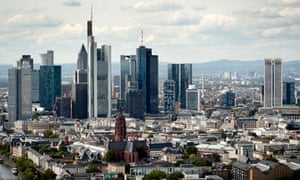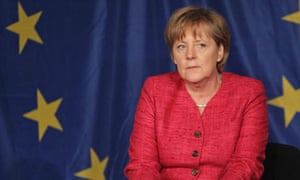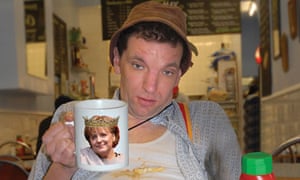In his novel Fatherland, Robert Harris envisaged a hellish scenario – Hitler won the second world war. Decades later, the Greater German Reich extends from the Rhine to the Caspian Sea. The rest of Europe, though notionally consisting of independent states, is really under the Nazi jackboot.
Sound familiar? Of course not. That nightmare never came to pass. Happily, Germany does not rule Europe. Or does it? Munich-based sociologist Ulrich Beckargues in his new book that the eurozone catastrophe has given birth to a political monster: a German Europe. When, on 1 July this year, Croatia becomes a member, the European Union will contain 500 million people and be the largest market and trading bloc in the world.
"The new German power in Europe is not based as in former times on force," writes Beck in German Europe. Which is a consolation. "It has no need of weapons to impose its will on other states," he says. "It has no need to invade, and yet is ubiquitous."
His homeland's latest iron chancellor Angela Merkel rules Europe, imposing German values on feebler client nations, bailing out southern Europeans with their oversized public sectors, rampant tax evasion and long lunches. "In the countries most harshly affected by the crisis, many people think they are losers because the austerity policy pursued jointly by Berlin and Brussels deprives them of their means of livelihood – and also of their human dignity," argues Beck.
Other Germans, naturally, don't see it quite that way. The official line from the German embassy in London is that Germany is helping other European economies to become globally competitive and more able to take on emerging markets. "Germany was among the first to have started this endeavour and therefore might temporarily be a little ahead of others," says spokesman Norman Walter. "Our main political drive over the last few years has been to increase competitiveness in all eurozone and EU member states."
To get a different perspective on German domination of Europe, I consult a standup comic: Henning Wehn, a German comedian who is tired of being called an oxymoron by Britons, and is in the middle of a UK tour. The blurb for his show goes: "According to Henning, there's no shortcut to success, hard work will eventually pay off and there is no shame in paying tax." How this transmutes into comedy is anybody's guess, but it seems to suggest that Wehn believes slacker Europe needs a German economics lesson. "Well, economically Germany is mainly dominant because it is the country with most people," says Wehn. "It also has several things that explain its economic success and from which others can learn – our system of apprenticeships, our building societies that help entrepreneurs. When David Cameron spoke about strivers and skivers, that reminded me of a Swabian saying: 'Schaffe, schaffe, Häusle baue!' It means: "Work, work, build your little house!' That sort of striving is deep in German identity."
The worry is that Germany thinks of itself as a nation of strivers bankrolling a continent of skivers. "German money [is being] thrown away on the bankrupt Greeks," ran a headline in the tabloid Bild, while Focus magazine had a cover image of the Venus de Milo giving the finger to the world. "If Ireland and Greece sank into the sea tomorrow, Germany would be quietly relieved," says Simon Winder, publishing director at Penguin and author of Germania: A Personal History of Germans Ancient and Modern. "Germany today reminds me of the British Empire, burdened with non-lucrative colonies that it has to defend when all it's really bothered about is India. The problem for Germany is that it has no India just, as it were, lots of Sierra Leones."
The latest euro crisis over Cyprus bears out Beck's analysis. According to Newsnight's Paul Mason, the Germans want to "avoid creating a moral hazard, rewarding a country that has sold itself as a rule-free playground for Russians who want to keep their money". For German politicians, and not just those of Merkel's ruling Christian Democratic Union, that irresponsible nonsense can't go on for ever: it's time for Cyprus to wake up and smell the austerity. Beck argues that Germany is teaching Cyprus a moral lesson, namely that, as he puts it: "Suffering purifies. The road through hell, the road through austerity, leads to the heaven of economic recovery." It's a very German lesson, borne of the philosophies of Martin Lutherand Max Weber and based on the protestant work ethic. That doesn't play too well in Nicosia: hence all those "Merkel – Kaput" banners waved by soon-to-be redundant employees of Cyprus's Popular Bank.
But what are the Germans getting out of teaching allegedly slacker Europeans how to run their economies? For Beck, Germany's European dominance has given the nation a new sense of identity after decades of Nazi guilt, and provides liberation from what he calls the "never again syndrome" – never again a Holocaust, never again fascism, never again militarism. After the second world war and the Holocaust, he argues, Germany was in ruins morally and economically. Now, in both senses, it is back.
The origins of German economic dominance predate our current crisis. More than 20 years ago, Germany made a sacrifice for Europe at Maastricht when it agreed to put the deutschmark to the sword so that another currency could be born. "The tragedy for the Germans is that they viewed the euro as their great, healing gift to the rest of Europe, an act of self-denial in which they cashed in their totemic deutschmark for the continent's greater good," says Winder. Since the fall of Hitler, it has been Germany's self-imposed obligation to help build a Europe where the petty nationalisms that had ruined the continent in two world wars could be definitively overcome.
It's all about Vergangenheitsbewältigung, which means (roughly) the struggle to come to terms with the past – and, in particular, a Nazi past. (Maybe Britain will some time undergo its own Vergangenheitsbewältigung for its imperial shame, but that's another story.) "The Germans no longer wish to be thought of as racists and warmongers," Beck says. "They would prefer to become the schoolmasters and moral enlighteners of Europe." It's a moot question whether the rest of Europe wants to be on the receiving end of German enlightenment. "Germany's chorus of I-want-to-teach-the-world-to-sing doesn't play too well in Tring or Extramadura," says Winder.
But that's the Teutonic song: two decades ago, Germany after reunification was once as Greece is today, with a stagnating economy and five million unemployed. But, thanks to neoliberal austerity and taking on the Protestant notion that "suffering purifies", the Germans were able to realise a jobs miracle. Now, Beck argues, German reunification is being used as the template for German crisis management in Europe. As head of the continent's strongest economic power, Merkel is in a position to dictate the terms under which struggling eurozone nations can apply for further credit, eroding the democratic autonomy of the Greek, Italian and Spanish parliaments. Beck calls her Merkiavelli – after Machiavelli – to highlight the political nous with which she has run rings around other leaders.
He suggests that she is the uncrowned queen of Europe. Queen Merkiavelli the First of Europe, perhaps, demands that Germany's new colonies save in the interests of stability – a formula based on the good housekeeping practices of a woman who sometimes casts herself as a sensible Swabian housewife. Beck's chancellor sounds like Margaret Thatcher, who also prudently approached the balancing of government accounts as though they were a household budget. "There is one important difference," Beck says. "Thatcher was doing to Britain something the British electorate had voted for. What Merkel is doing to Europe has no democratic mandate."
Viewed thus, Germans are power-crazed anti-democrats using economic crisis to stage a furtive putsch on a supine continent. Aren't we witnessing a German power grab? "Heavens, no. They have no imperial bone left in their body," argues Winder. "They are colonists, but incredibly reluctant ones. There is no smoke-filled room filled with sausage-eating Germans who want to dominate Europe. There is no conspiracy."
"I think that's an incredibly silly point to make," says Wehn. "German dominance in Europe is not anti-democratic. There are parts of Europe that are economically ahead of other parts. It's just the same in Britain: London is economically ahead of the north-east of England. So should London leave sterling? That's obviously a silly answer. The same is true in Europe. There are fishing villages in Greece that are going to be economically negligible, while Germany is dominant. Does that mean we should leave the euro? No! A strong Europe needs a strong Germany."
There is, though, a paradox in Germany's European domination. It is economically supreme, but culturally negligible. Some of us are enjoying theWagner bicentenary, but it can hardly be argued that his music indicates the virility of German cultural exports in the new millennium. Nobody is wearing lederhosen in Glasgow or Warsaw. Next to nobody is learning German as a foreign language. Your next box set might well be in Danish but nobody's will be in German. Fatih Akin, Christian Petzold, Hans-Christian Schmid and Ulrich Köhler have one thing in common: few have heard of these alleged icons of German new wave cinema outside Germany. Yes, the Tate's website did crash briefly when it was announced that tickets were available for the Kraftwerk gig at the Turbine Hall, but that's the exception that proves the rule.
"They're living on empty, culturally," says Winder. "There's no German novel I'm looking forward to, and no German film. But it's the same throughout Europe. Europe is culturally null. Britain is the cultural dynamo of Europe by a million miles."
Why is Germany failing to export its cultural goods with the success of, say, its car, machine tool or optics industries? "There's one simple reason," replies Wehn. "Bismarck didn't believe in colonies." What Wehn means by that is that the 19th-century German chancellor, who presided over a vast and recently unified people, decided not to emulate Britain, Spain and France in their imperial land grabs. As a result, German never became a global language; English became the world's most widely spoken tongue. "The English language is dominant because of Hollywood and that helps British culture," says Wehn. In a recent survey by Monocle magazine, Britain was found to be the world's leader in what's called "soft power"– a country's ability to make friends and influence people not through military might but through culture, education, language and values. "In short, the things that make people love us rather than fear us," says John Worne, the British council's director of strategy.
Germany, by contrast, is feared for its economic dominance. At the same time it seems culturally insular. What a shame we don't get more German culture here. After all, the British and Germans are, one world cup and two world wars notwithstanding, simpatico. Germanophile 19th-century historian Thomas Carlyle wrote of Germany "speaking the same old Saxon tongue and thinking in the same old Saxon spirit with ourselves", while George Orwell wrote that during the first world war "the English working class were in contact with foreigners to an extent that is rarely possible. The sole result was that they brought back a hatred of all Europeans, except the Germans, whose courage they admired."
Norman Walter at the German embassy argues that the case for his homeland's cultural nullity is weak. "Well, we're not exactly world champions – but we aren't that bad either." Ingeniously, he quotes back at me a string of Guardian arts stories that seem to suggest German culture thrives here. Last year's gig by heavy-metal band Rammstein in 2012 sold out within minutes and Dave Simpson's five-star review described it as "the rock show of the year". Judith Mackrell argued that Tanztheater Wuppertal's London retrospective World Cities was "revelatory". Similarly, the Economist noted that "British enthusiasm for modern German culture is quietly growing" and that "a new breed of artists is changing British tastes in German culture". And today there's Kurt Schwitters at Tate Britain, Rosemarie Trockel at the Serpentine Gallery. Nobody even mentions the great German art on show at the Northern Renaissance exhibition at the Queen's Gallery, but they really should.
Yes, but visual art and music are the most readily exportable cultural products. Hardly any German literature makes it into the bestseller lists here. In Germany now, the bestseller lists are dominated by Timur Vermes's novel Er is wieder da(He's back), which is about Hitler. The führer awakes in Berlin in the summer of 2011, having fallen asleep in 1945. Hitler becomes a media celebrity before entering politics where he campaigns against dog muck and speeding. The book has sold more than 400,000 copies in Germany, but is as yet untranslated here. A shame: it's a popular account of German Vergangenheitsbewältigung that deserves to be read in Britain. Maybe more Britons should learn German.
And what about German TV? Why, I ask Wehn, are there no German TV series filling BBC4's 9pm Saturday night Euro-drama subtitle-a-rama slot? He contends that we aren't missing much, apart from a cop show called Derrick, which finished broadcasting 15 years ago. But why is there no German rival to Denmark's The Killing, Sweden's Wallander, Italy's Inspector Montalbano or France's Spiral? "In Germany there's no incentive to sell TV content abroad. The BBC makes a lot of money from selling foreign rights, which explains why so much of its content is shown overseas. In Germany, the contracts aren't like that – and the domestic market is huge so there's no incentive."
What does a German Europe mean for the economically bumbling yet allegedly cultural dynamic Britain? "It is drifting into irrelevance," replies Beck. "There is already a two-speed Europe, with a pioneer Europe in the eurozone that the rest of Europe, especially Britain, doesn't really take part in decisions about. Cameron doesn't realise there's a shifting power base in Europe but instead focuses on withdrawal from Europe." Folly, he argues. "Europe isn't across the Channel. For the first time every European citizen existentially depends on Europe." But that too is a German perspective: Britons have rarely gone for continental things such as existentialism, still less a cosmopolitan transcontinental menage.
Unsurprisingly, as a good German committed to the end of petty nationalisms, Beck counsels more powers to the European Union to bring the undemocratic reign of Queen Merkiavelli to an end. In the past, budgetary credits were tied to austerity and neo-liberal reform: in the future, Beck argues, they should be linked to a readiness to support a new, continent-wide social contract set up to defend job security, extend freedom and promote democracy.
Good luck with all that, Professor, I say. "It may well sound hopelessly utopian and naive," he replies, "but why not be utopian and naive? Look at the alternative." Maybe only Germans, thanks to the darkness of their 20th-century past, have such sunny hopes for this benighted continent. It's a different kind of German Europe from the one Beck indicts and one that nobody need fear: not one premised on Teutonic austerity, but filled with a European idealism you get hardly anywhere else on this cynical continent, least of all in Britain.




















